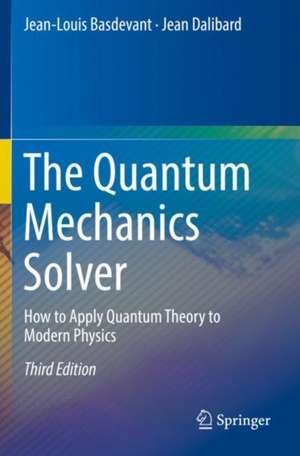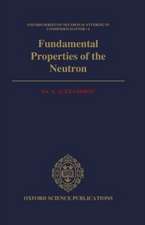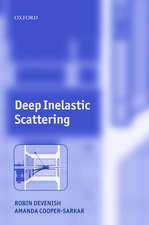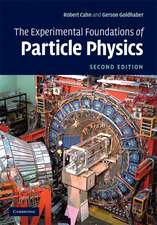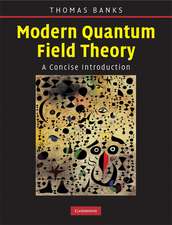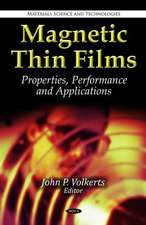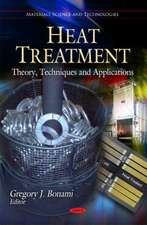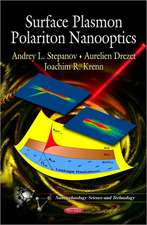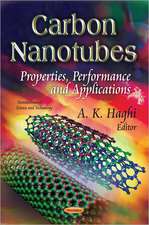The Quantum Mechanics Solver: How to Apply Quantum Theory to Modern Physics
Autor Jean-Louis Basdevant, Jean Dalibarden Limba Engleză Paperback – 27 oct 2020
This new edition has been extended with sections on neutrino oscillations, quantized vortices in Bose-Einstein condensates, quantum correlations in multi-particle systems, Bloch oscillations in periodic lattices and non-destructive quantum measurements.
| Toate formatele și edițiile | Preț | Express |
|---|---|---|
| Paperback (1) | 458.61 lei 6-8 săpt. | |
| Springer International Publishing – 27 oct 2020 | 458.61 lei 6-8 săpt. | |
| Hardback (2) | 394.12 lei 6-8 săpt. | |
| Springer Berlin, Heidelberg – 13 sep 2005 | 394.12 lei 6-8 săpt. | |
| Springer International Publishing – 3 iun 2019 | 537.29 lei 6-8 săpt. |
Preț: 458.61 lei
Nou
Puncte Express: 688
Preț estimativ în valută:
87.75€ • 91.63$ • 72.46£
87.75€ • 91.63$ • 72.46£
Carte tipărită la comandă
Livrare economică 15-29 aprilie
Preluare comenzi: 021 569.72.76
Specificații
ISBN-13: 9783030137267
ISBN-10: 3030137260
Pagini: 352
Ilustrații: XIII, 352 p.
Dimensiuni: 155 x 235 x 23 mm
Greutate: 0.51 kg
Ediția:3rd ed. 2019
Editura: Springer International Publishing
Colecția Springer
Locul publicării:Cham, Switzerland
ISBN-10: 3030137260
Pagini: 352
Ilustrații: XIII, 352 p.
Dimensiuni: 155 x 235 x 23 mm
Greutate: 0.51 kg
Ediția:3rd ed. 2019
Editura: Springer International Publishing
Colecția Springer
Locul publicării:Cham, Switzerland
Cuprins
Part I Elementary Particles, Nuclei and Atoms.- 1 Matter-wave Interferences with Molecules.- 2 Neutron Interferometry.- 3 Analysis of a Stern–Gerlach Experiment.- 4 Spectroscopic Measurements on a Neutron Beam.- 5 Measuring the Electron Magnetic Moment Anomaly.- 6 Atomic Clocks.- 7 The Spectrum of Positronium.- 8 Neutrino Transformations in the Sun.- 9 The Hydrogen Atom in Crossed Fields.- 10 Energy Loss of Ions in Matter.- Part II Quantum Entanglement and Measurement.- 11 The EPR Problem and Bell’s Inequality.- 12 Quantum Correlations in a Multi-Particle System.- 13 A Non-Destructive Bomb Detector.- 14 Direct Observation of Field Quantization.- 15 Schrödinger’s Cat.- 16 Quantum Cryptography.- 17 Ideal Quantum Measurement.- 18 The Quantum Eraser.- 19 A Quantum Thermometer.- 20 Laser Cooling and Trapping.- Part III Complex Systems.- 21 Exact Results for the Three-Body Problem.- 22 Properties of a Bose–Einstein Condensate.- 23 Quantized Vortices.- 24 Motion in a Periodic Potential and Bloch Oscillations.- 25 Magnetic Excitons.- 26 A Quantum Box.- 27 Colored Molecular Ions.- 28 Hyperfine Structure in Electron Spin Resonance.- 29 Probing Matter with Positive Muons.- 30 Quantum Reflection of Atoms from a Surface.- Part IV Appendix.- 31 Memento of Quantum Mechanics.
Notă biografică
Professor Jean-Louis Basdevant is a High energy physicist, author of physics textbooks and science history books. A former student of Ecole Normale Supérieure, he was from 1975 to 2005 professor of physics at the Ecole Polytechnique, where he taught quantum physics to generations of students, and also chaired the physics department. In research, his work focused on the three-body problem in quantum mechanics, elementary particles, quantum field theory and astrophysics.
Professor Jean Dalibard is a professor at Collège de France and a member of the Laboratoire Kastler Brossel. He was a professor at Ecole Polytechnique from 1989 to 2015, and taught quantum physics, statistical physics and quantum optics. His current research is devoted to the properties of ultracold quantum matter, like Bose-Einstein condensates and superfluids. He is a member of the French Academy of Sciences.
Professor Jean Dalibard is a professor at Collège de France and a member of the Laboratoire Kastler Brossel. He was a professor at Ecole Polytechnique from 1989 to 2015, and taught quantum physics, statistical physics and quantum optics. His current research is devoted to the properties of ultracold quantum matter, like Bose-Einstein condensates and superfluids. He is a member of the French Academy of Sciences.
Textul de pe ultima copertă
This textbook presents problems with detailed solutions showing how to apply quantum theory to modern physics. The text is divided in three parts, the first dealing with elementary particles, nuclei and atoms, the second presents quantum entanglement and measurement. Finally complex systems are examinated in depth. The aim of the text is to guide the student towards applying quantum mechanics to research problems. Advanced undergraduates and graduate students will find a rich and challenging source for improving their skills.
This new edition has been extended with sections on neutrino oscillations, quantized vortices in Bose-Einstein condensates, quantum correlations in multi-particle systems, Bloch oscillations in periodic lattices and non-destructive quantum measurements.
This new edition has been extended with sections on neutrino oscillations, quantized vortices in Bose-Einstein condensates, quantum correlations in multi-particle systems, Bloch oscillations in periodic lattices and non-destructive quantum measurements.
Caracteristici
Offers an extensive selection of problems applying quantum theory to modern physics with all the necessary steps to solve them Presents worked problems from modern physics to help the student apply just-learnt theory to fields such as molecular physics, condensed matter physics, laser physics, quantum physics and complex systems Provides examples of most of the typical problems that students will encounter in qualifying exams Works through very detailed solutions to the more complex problems
Recenzii
From the reviews of the second edition:
"This problem based textbook is a concise and particularly useful reference of quantum mechanics as used in a large range of modern applications in physics. … At the end of each section worked solutions, references and general comments are given … . this book of problems would be very useful for any physics departmental, or indeed individual research group, library. Highly recommended." (Lloyd C L Hollenberg, Australian Physics, Vol. 32 (6), 2007)
"This problem based textbook is a concise and particularly useful reference of quantum mechanics as used in a large range of modern applications in physics. … At the end of each section worked solutions, references and general comments are given … . this book of problems would be very useful for any physics departmental, or indeed individual research group, library. Highly recommended." (Lloyd C L Hollenberg, Australian Physics, Vol. 32 (6), 2007)
